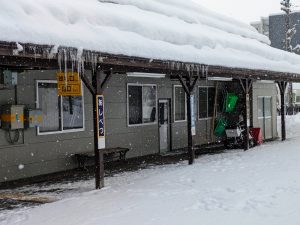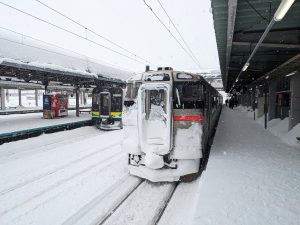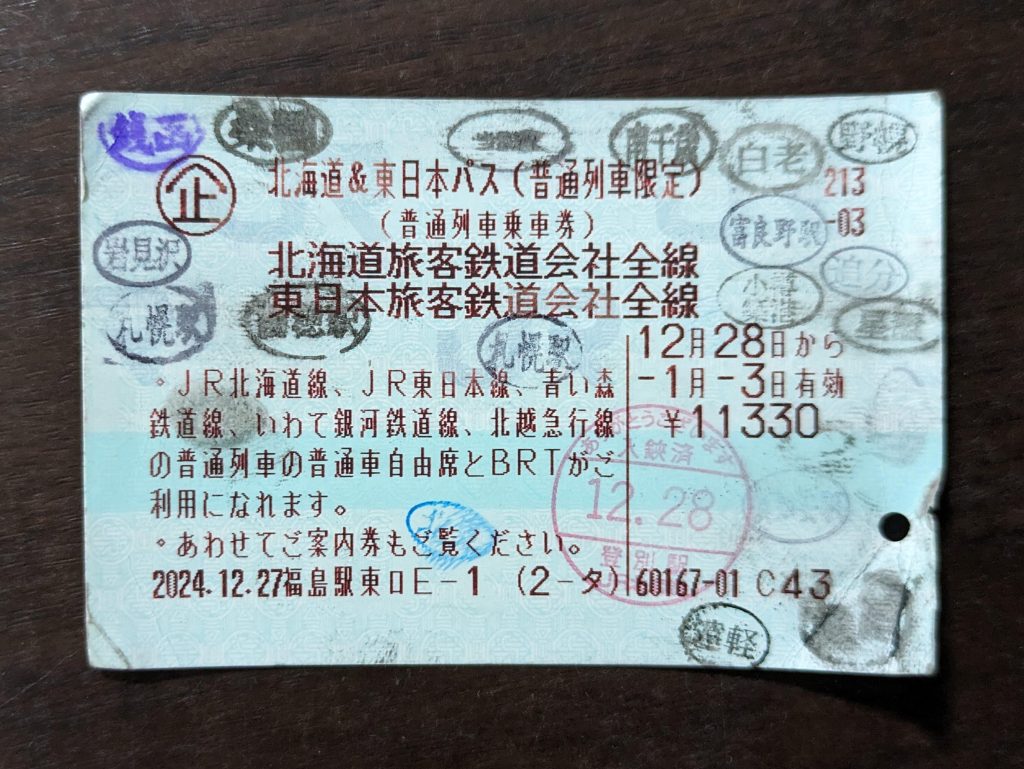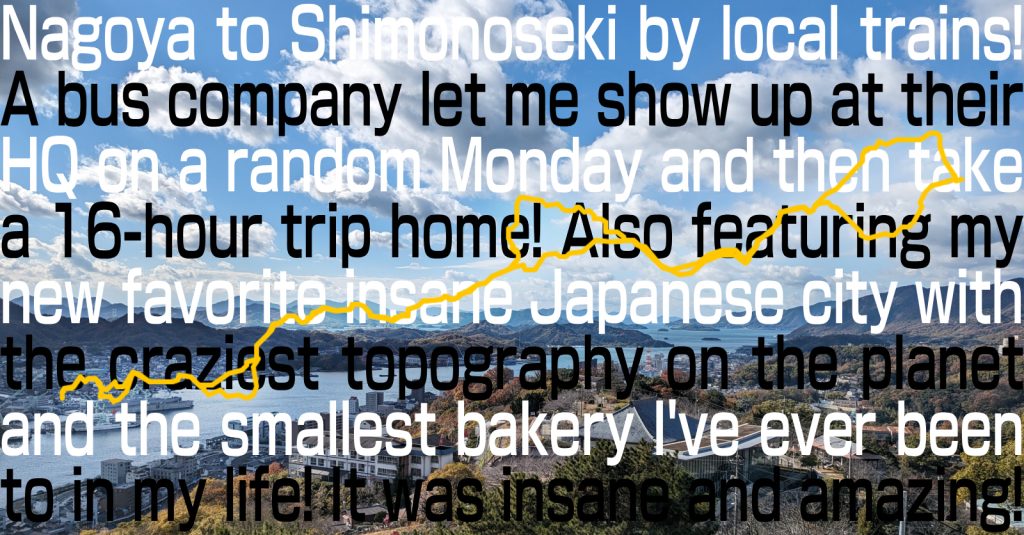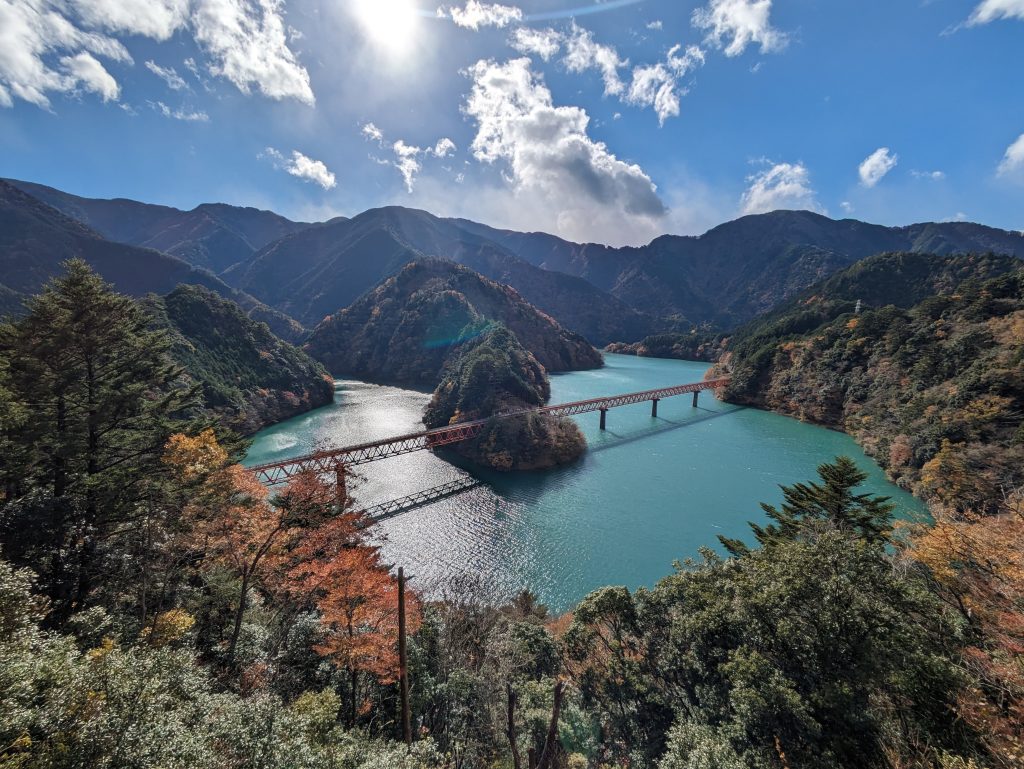Japan is so hot. So absolutely, unlivably hot for a solid four, arguably even five months of the year. But I grew up in the snow – it’s my favorite type of weather, and winter is my favorite season bar none, so for my second year-end holiday period in Japan, I went up to Hokkaido, the last of Japan’s major islands I’d yet to explore, home to some of the world’s snowiest places (and, not coincidentally, also from where I was missing quite a number of IC cards!)
And what can I say? Well, it was cold… and pure magic.
I traveled around with this ticket, the “Hokkaido & East Japan Pass”, which is like the Seishun 18 Kippu I’ve talked about in two previous posts, but just for the JR East and Hokkaido regions. So that means all local trains… the 鈍行列車 donko ressha, or slow trains, the kinds that let you soak up all that great local culture and feeling… and loads of travel time through snowy landscapes:
Partway through my trip, I decided to start asking for stopover stamps, seen in the photo above – a practice that I’ve continued to do with all my long tickets since. It wasn’t strictly necessary with an all-you-can-ride “free pass” like this one, but they’re a fun representation and visualization how much I’ve traveled on a certain ticket. Every station where I alighted got its name marked in a colored oval, and while Hokkaido does have some automatic ticket gates in urban areas, a lot of the island (and severely underfunded, in-debt, still-government-subsidized rail company) is still doing everything by hand, and there’s something quaint about this way of capturing how much benefit I’m getting from their services – and, frankly, JR Hokkaido was wonderful. I’d heard how unreliable trains up north were for delays due to weather, and with services more generally on the decline due to financial problems, but my experience on the network was really exceptional, surpassing my expectations; I felt welcomed by accommodating and kind station staff and impressive operations even through very inclement weather. It comes across as if the rest of the country is oftentimes eager to shut things down at the first sign of wind or rain… but not JR Hokkaido! Go JR Hokkaido!
My trip was nine days – I shot up to Noboribetsu on the shinkansen the first day, with a brief stopover in Fukushima (to get an IC card) and then transfer in Sendai, leaving pretty early that morning to make it to my ryokan by dinnertime. Riding the train up there as opposed to flying was great, since I got to see the country get snowier and snowier as I got more and more north. After that I headed toward Sapporo, but then quickly sped over to Asahikawa the next morning – my beloved, oh man I can’t wait to go back, more on this below – to get some more IC cards, since one of the ticketing offices was closed the entirety of the New Year’s holidays! Then it was back to Sapporo (spontaneously via a different long route) as I figured Hokkaido’s largest city would be the best place to spend New Year’s Eve and the first couple quiet days of the year. I rode around the whole metro and streetcar system, and took a day trip up to Otaru as well. Finally, I headed far east to Kitami to grab my final IC card from Hokkaido and, of course, freeze my butt off too. After a day on the eastern coast of the island in Abashiri, and a quick jaunt to Shari at the base of the Shiretoko Peninsula, I flew home, from a tiny airport with their one-direct-flight-a-day back home to Nagoya. I have way too many photos – I did say snow was my favorite weather, after all… – and so many stories. And as always, it came with a ton of fun signs seen, great food eaten, cozy trains ridden, &c &c. Hopefully you’ll enjoy reading about some of my adventures here!



